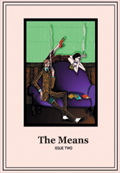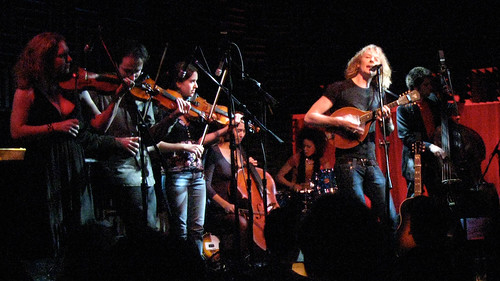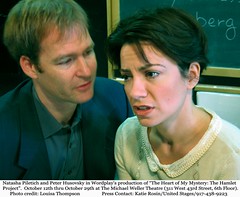Tahiti 80, Fosbury
The French band Tahiti 80’s latest CD is chock full of sunny disco-soul, with lead singer’s Xavier Boyer’s ethereal voice soaring like a sleepy Smokey Robinson above graceful retro dance-pop arrangements. The best songs, like “Big Day,” “Changes,” and “Chinatown,” get the blood flowing, while the gentle “Take Me Back” shows the band can do a spare little ballad just right. “Matter of Time” harks back to Motown. So does “Give It Away,” which leads off the extra four-song EP that’s been included with the US release. “Cherry Pie,” by contrast, leans heavily on techno drums. Both sounds work for this inventive band.
The bonus EP also includes a reverent version of the Turtles’ classic “Happy Together,” which makes explicit the band’s obvious (yet strangely little-noted by the press) debt to bubblegum pop.
There are a couple too many songs on the main CD, but Tahiti 80’s curious, light, highly danceable and newly mature sound is very appealing. Listening to it one might think – just for a little while – that we don’t live in such a troubled world after all.
You can hear several tracks at their Myspace page.
Carey Ott, Lucid Dream
Listening to Carey Ott’s debut on Dualtone Records, I get that feeling of deja vu that often accompanies first exposure to a singer-songwriter. But what am I hearing, exactly?
Are his high notes a little like Thom Yorke’s? Yes, I suppose. Do the slow songs tinkle and droop like Tom Petty’s? Yeah, but…
Oh, right. Of course. The Beatles!
In some songs, it’s George Harrison, who I suspect might just be the most influential Beatle of all. In others, it’s John Lennon. The CD opens with the highly hooky “Am I Just One,” which is followed by “Daylight” in which a Radiohead influence is apparent, as it is in the gently insistent “Virginia.” Vocally, Ott often suggests Ray Davies singing in tune, and his “It’s Only Love” is clearly Kinks-inspired (in spite of having taken a Beatles song title).
“I Wouldn’t Do That To You” is another top-notch song. Indeed Ott’s knack for setting fine wordcraft to snappy melodies is evident throughout the CD. In “Shelf Life” he puts a Lennonesque effect on his voice to sing some of his most poetic lyrics: “Warsaw in winter, flowery graves/Can you still hear them whisper your name?/Afraid of the cold spots, caught in the tree tops/Love is a dogfight.” He closes the lovely “Kickingstones” with a succinct declaration of the power of song: “Isn’t love what you play for?/Don’t you have all that you need?”
And – there it is! The McCartney side of Ott’s Beatletude shines out in the powerful pop of “You Got Love.”
The only weak point – though it may be a significant one – is the lack of a distinctive sound. The only thing even mildly unusual about Ott’s arrangements is the tasteful but prominent use of keyboards, including a Fender Rhodes. His singing voice is pleasing and assured but he sounds like a million other singers. Breakout artists tend to be those who have that little something extra or different.
Despite this reservation, I recommend checking out Carey Ott if you appreciate well-crafted and emotionally charged songwriting delivered with talent and class.
Red Wanting Blue, Live: The Warehouse Sessions
Heartland pop-rock, heavy on acoustic guitar and piano – that’s Red Wanting Blue. It’s fine in small doses. But excessive earnestness and melodic sameness consign this long, live CD to the boredom bin.
Its companion DVD contains much of the same concert, but, unlike in the similarly packaged set from The Clarks, this band seems to be playing for the recording engineer and not for the fans, who supply energy and enthusiasm that the bored-looking musicians don’t reflect. The recording quality is good and the DVD authoring excellent, with several amusing extras, all of which will perhaps make the set desirable to the band’s fans. But the concert itself is not an impressive introduction to Red Wanting Blue.
Listen at their Myspace page.
Elizabeth and the Catapult, self-titled EP
This EP opens with the nifty pop-jazz tune “Waiting for the Kill,” a galloping 5/8 number with acid-sweet vocals from singer-songwriter-keyboardist Elizabeth Ziman and hopping acoustic bass from Jordan Scannella. The smoky jazz flavor carries through to the lush ballad “Right Next to You,” but Ziman’s feathery vocals work better in the quirky “Momma’s Boy” and the vampy verses of “Devil’s Calling.” Overall the music is interesting and pleasingly arranged but hurt by a lack of vocal heft. Precision songcraft lets Norah Jones get away with this, but with music that doesn’t quite hit that bullseye, more oomph is needed at the music’s focal point, which in this case is the singing.
Don’t miss Ziman’s ethereal keyboard work in the closing ballad, “Golden Ink.”




